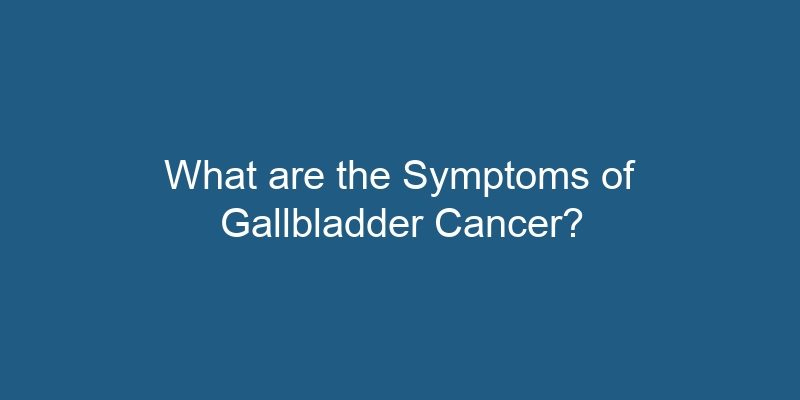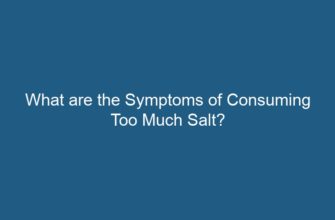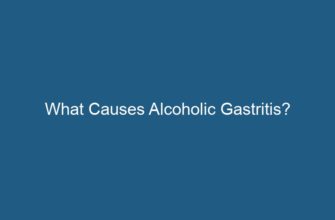Gallbladder cancer, also known as biliary tract cancer, is a relatively rare but aggressive form of cancer that starts in the gallbladder. It is important to be aware of the signs and symptoms associated with this disease to ensure early detection and timely treatment. In this article, we will explore the various symptoms of gallbladder cancer, their possible causes, and the importance of seeking medical attention if you experience any of these symptoms.
- 1. Abdominal Pain
- 2. Jaundice
- 3. Unexplained Weight Loss
- 4. Loss of Appetite and Nausea
- 5. Fever and Chills
- 6. Fatigue and Weakness
- 7. Changes in Stool Color
- 8. Back Pain
- 9. Enlarged Lumps in the Abdomen
- 10. Other Symptoms
- Frequently Asked Questions (FAQs)
- 1. Can gallbladder cancer be detected through routine screenings?
- 2. What are the risk factors for developing gallbladder cancer?
- 3. How is gallbladder cancer diagnosed?
- 4. What are the treatment options for gallbladder cancer?
- 5. Can gallbladder cancer be prevented?
- 6. What is the prognosis for gallbladder cancer?
- 7. Is gallbladder cancer hereditary?
- Conclusion
1. Abdominal Pain
One of the most common symptoms of gallbladder cancer is abdominal pain. This pain is usually located in the upper right side of the abdomen, where the gallbladder is situated. The pain may be dull or sharp, and it can come and go or be persistent.
The exact cause of the abdominal pain in gallbladder cancer is not fully understood, but it is believed to be related to the tumor’s growth and its impact on the surrounding tissues and organs. As the tumor progresses and grows larger, the pain may become more severe.
2. Jaundice
Jaundice is another significant symptom of gallbladder cancer. It is a condition characterized by the yellowing of the skin and eyes, caused by the buildup of bilirubin in the body. In gallbladder cancer, the tumor may obstruct the bile ducts, preventing the flow of bile from the liver to the intestine. This causes a buildup of bilirubin, resulting in jaundice.
Jaundice may also be accompanied by other symptoms such as dark urine, pale stools, itching, and generalized weakness. If you notice any yellowing of your skin or eyes, it is crucial to seek medical attention promptly.
3. Unexplained Weight Loss
Unexplained weight loss is a common symptom in many types of cancer, including gallbladder cancer. Cancer cells can alter the body’s metabolism, leading to weight loss even if you have not made any changes to your diet or exercise routine.
In gallbladder cancer, weight loss can occur due to a variety of reasons. The tumor may interfere with the digestion and absorption of nutrients, leading to a decreased appetite and subsequent weight loss. Additionally, cancer cells can also release substances that increase metabolism and cause weight loss.
4. Loss of Appetite and Nausea
Gallbladder cancer can also cause a loss of appetite and feelings of nausea. The tumor’s presence and its impact on the digestive system can disrupt the normal functioning of the gallbladder, liver, and other organs involved in digestion.
Loss of appetite and nausea can also be caused by the release of certain substances by the cancer cells, which can affect the brain’s appetite-regulating mechanisms. These symptoms may be intermittent or persistent, depending on the stage and progression of the cancer.
5. Fever and Chills
Fever and chills are common symptoms associated with various infections and inflammatory conditions. In gallbladder cancer, these symptoms may occur due to the presence of an infection or inflammation caused by the tumor.
The tumor can cause blockages in the bile ducts, leading to the accumulation of bile and subsequent infection. Infections can result in fever and chills, along with other symptoms such as abdominal pain and jaundice.
6. Fatigue and Weakness
Chronic fatigue and weakness are symptoms that can be observed in many types of cancer, including gallbladder cancer. Cancer cells can impact the body’s energy production and utilization, leading to feelings of persistent fatigue and weakness.
In gallbladder cancer, fatigue and weakness can be further exacerbated by other symptoms such as weight loss, loss of appetite, and the body’s immune response to the tumor. If you experience unexplained and persistent fatigue, it is important to consult with a healthcare professional.
7. Changes in Stool Color
In some cases, gallbladder cancer can cause changes in stool color. The obstruction of the bile ducts by the tumor can prevent the normal flow of bile into the intestine, resulting in pale or clay-colored stools.
It is essential to note that changes in stool color can also be caused by other non-cancerous conditions such as gallstones or liver diseases. However, if you notice persistent changes in your stool color, it is advisable to consult a medical professional for further evaluation.
8. Back Pain
Back pain is another symptom that may be associated with gallbladder cancer. The tumor’s location and its impact on the surrounding tissues and organs can cause referred pain to the back.
Back pain in gallbladder cancer is often described as a dull ache or pressure-like sensation. It may be located in the upper back or between the shoulder blades. If you experience persistent or worsening back pain, it is important to seek medical attention for proper evaluation.
9. Enlarged Lumps in the Abdomen
In some cases, gallbladder cancer can cause the development of enlarged lumps or masses in the abdomen. These lumps may be felt during a physical examination or discovered through imaging tests such as ultrasound or CT scan.
The presence of enlarged lumps in the abdomen may indicate advanced stages of gallbladder cancer, where the tumor has spread to nearby organs or lymph nodes. It is crucial to consult with a healthcare professional if you notice any unusual lumps or masses in your abdomen.
10. Other Symptoms
In addition to the symptoms mentioned above, gallbladder cancer can also cause other less common symptoms, including:
- Swollen abdomen
- Ascites (fluid buildup in the abdomen)
- Itching
- Generalized discomfort
- Worsening jaundice
These symptoms may vary depending on the stage and progression of the cancer, as well as individual factors such as overall health and immune response. If you experience any persistent or concerning symptoms, it is important to seek medical attention for proper evaluation and diagnosis.
Frequently Asked Questions (FAQs)
1. Can gallbladder cancer be detected through routine screenings?
No, routine screenings for gallbladder cancer are not currently recommended. Gallbladder cancer is relatively rare, and there are no specific screening tests available for its early detection. However, if you experience any symptoms or have risk factors for gallbladder cancer, it is important to discuss them with your healthcare provider.
2. What are the risk factors for developing gallbladder cancer?
Several factors can increase the risk of developing gallbladder cancer, including:
- Older age
- Female gender
- Obesity
- Gallstones
- Chronic inflammation of the gallbladder (cholecystitis)
- Porcelain gallbladder
- Family history of gallbladder cancer
It is important to note that having one or more of these risk factors does not necessarily mean that you will develop gallbladder cancer. Conversely, some individuals without any known risk factors may still develop the disease.
3. How is gallbladder cancer diagnosed?
The diagnosis of gallbladder cancer usually involves a combination of medical history evaluation, physical examination, imaging tests (such as ultrasound, CT scan, or MRI), and laboratory tests (including blood tests and tumor marker analysis). In some cases, a biopsy may be necessary to confirm the presence of cancer cells.
4. What are the treatment options for gallbladder cancer?
The treatment options for gallbladder cancer depend on several factors, including the stage and extent of the cancer, the individual’s overall health, and personal preferences. Treatment may include surgery (such as gallbladder removal, liver resection, or lymph node removal), chemotherapy, radiation therapy, targeted therapy, or a combination of these approaches.
5. Can gallbladder cancer be prevented?
There is no surefire way to prevent gallbladder cancer, but certain lifestyle choices may help reduce the risk. These include maintaining a healthy weight, eating a balanced diet rich in fruits and vegetables, exercising regularly, avoiding tobacco and excessive alcohol consumption, and managing chronic conditions such as gallstones or inflammation of the gallbladder.
6. What is the prognosis for gallbladder cancer?
The prognosis for gallbladder cancer depends on several factors, including the stage of the cancer at diagnosis, the individual’s overall health, and the response to treatment. Unfortunately, gallbladder cancer is often diagnosed at advanced stages when treatment options may be limited. The five-year survival rate for gallbladder cancer is relatively low compared to other cancers, highlighting the importance of early detection.
7. Is gallbladder cancer hereditary?
While most cases of gallbladder cancer are not hereditary, there may be a genetic component involved in some cases. Certain genetic conditions, such as Lynch syndrome or familial adenomatous polyposis (FAP), have been associated with an increased risk of developing gallbladder cancer. If you have a family history of gallbladder cancer, it is important to discuss it with your healthcare provider to determine if genetic testing is warranted.
Conclusion
Gallbladder cancer is a relatively rare but aggressive form of cancer that can present with various symptoms. Abdominal pain, jaundice, unexplained weight loss, loss of appetite, nausea, fever, and chills are some of the common symptoms associated with gallbladder cancer. Other symptoms may include fatigue, changes in stool color, back pain, and the development of lumps in the abdomen. If you experience any of these symptoms, it is crucial to seek medical attention promptly. Early detection and treatment can significantly improve the prognosis and increase the chances of successful outcomes.










